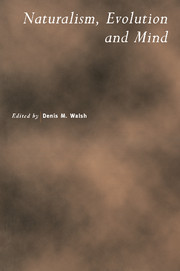Book contents
- Frontmatter
- Contents
- preface
- Notes on Contributors
- Editor's Introduction
- Mind the Adaptation
- Should Intentionality be Naturalized?
- Norms, History and the Mental
- What has Natural Information to do with Intentional Representation?
- Locke-ing onto Content
- The Evolution of Means-End Reasoning
- Rationality and Higher-Order Intentionality
- Theory of Mind in Non-Verbal Apes: conceptual issues and the critical experiments
- The Principle of Conservatism in Cognitive Ethology
- Domains, Brains and Evolution
- Evolution and the Human Mind: how far can we go?
- Index
The Principle of Conservatism in Cognitive Ethology
Published online by Cambridge University Press: 10 May 2010
- Frontmatter
- Contents
- preface
- Notes on Contributors
- Editor's Introduction
- Mind the Adaptation
- Should Intentionality be Naturalized?
- Norms, History and the Mental
- What has Natural Information to do with Intentional Representation?
- Locke-ing onto Content
- The Evolution of Means-End Reasoning
- Rationality and Higher-Order Intentionality
- Theory of Mind in Non-Verbal Apes: conceptual issues and the critical experiments
- The Principle of Conservatism in Cognitive Ethology
- Domains, Brains and Evolution
- Evolution and the Human Mind: how far can we go?
- Index
Summary
Philosophy of mind is, and for a long while has been, 99% metaphysics and 1 % epistemology. Attention is lavished on the question of the nature of mind, but questions concerning how we know about minds are discussed much less thoroughly. University courses in philosophy of mind routinely devote a lot of time to dualism, logical behaviourism, the mind/brain identity theory, and functionalism. But what gets said about the kinds of evidence that help one determine what mental states, if any, an individual occupies? Well, Skinner's puritanical disdain for postulating mental states gets raked over the coals, the problem of other minds gets solved by a perfunctory invocation of the principle of inference to the best explanation, and the Turing test gets discussed, mainly in order to emphasize that it can lead to mistaken answers.
An example of this bias toward metaphysics and away from epistemology may be found in the way philosophers often discuss Dennett's (1989) idea of the intentional stance. Dennett's principle is epistemological—it says that you should attribute mental states to a system when doing so helps you predict its behaviour. There is no point in treating relatively simple organisms and machines—like amoebas and hand calculators—as if they have minds; but more complicated systems—like primates and people and computers that play chess—make it almost irresistible for us to attribute mental states. The intentional stance is a piece of pragmatist epistemology. The problem with this idea is not that it is false, but that it is woefully short on details. In what circumstances does adopting the intentional stance enhance predictive accuracy?
- Type
- Chapter
- Information
- Naturalism, Evolution and Mind , pp. 225 - 238Publisher: Cambridge University PressPrint publication year: 2001
- 3
- Cited by

